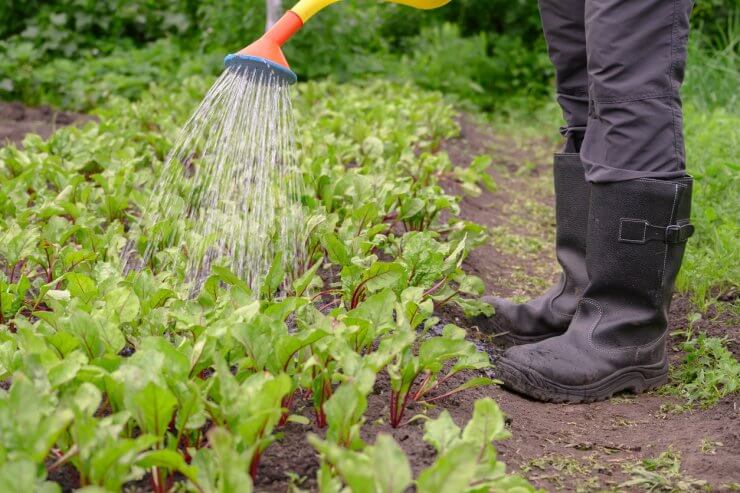
Gardener watering beets in garden
Water
Once your beets are settled in—whether it’s in a container, a raised bed, or open ground—consistency is key when it comes to watering. If you don’t get rain on a regular basis, go out and give your beets a good drink of water. Beets like soil that’s moist, but not soggy. Don’t kill your beet plants with kindness. Water, yes—just not too much.
In general, you’ll want to water deeply about once a week, so your plants get about an inch of water. If the top of the soil is a little dry, that’s OK. But don’t let the soil dry out. Dry topsoil can lead to cracked beetroots, and you certainly don’t want that! Lay down a layer of mulch to help retain moisture; ground-up leaves, clean grass clippings (no pesticides), or compost work well.
It’s always best to water in the morning, so your plants can soak up the water and put it to work. Watering earlier in the day also gives the sun time to burn off any water on the leaves. When you do water, aim for the base of the plant. Try not to get the leaves wet (unless you’re blasting off pests); that can open the plant to fungal infection.
Weeding
If you’ve planted in raised beds or containers, weeds shouldn’t be much of a problem. If you do see weeds, pull them early and often—but be gentle about it. Loosen the soil gently around your plants, especially when they’re young, so you don’t disturb their roots. For raised beds and containers, this is another good reason to get yourself some fresh garden soil; it’s one less piece of aggravation to deal with during the growing season.
But even if you’re growing your beets directly in the ground, properly preparing your soil is still an excellent preventive measure against the emergence of weeds. When you till or cultivate the area where you’ll plant your beets, remove weeds and debris. You’ll likely find that the first few weeks after planting are the only time you’ll be pulling up weeds around your plants. Of course, there’s nothing to say you can’t amend your garden bed with a little commercially available garden soil. Give your beets all the advantages you can to ensure a healthy crop.
If weeds spring up around your beets during the growing season, work the soil around the base of the plants with a hand rake—only deep enough to kill the weeds and not damage the plant’s roots.
Fertilizer
If you already have healthy, nutrient-rich soil, you shouldn’t need fertilizer. If you’ve have your soil tested, you have a detailed breakdown of your soil composition, along with recommendations for any necessary amendments.
Boron deficiency in the soil is a common problem when growing beets in chalky soil or soil that’s recently been limed. If you’ve had your soil tested and it calls for the addition of boron, amend the soil with 1 1/2 teaspoons per square yard of soil before you plant. However, if your beets are already growing you can sprinkle the borax along each row. It’s not a lot, but it helps them grow well.
If you feel your beet plants aren’t flourishing, you can apply any good vegetable fertilizer. Just be sure to follow the application directions.
How often do you have to fertilize or water your beets? Do you have any particular challenges growing beets? Please tell us your tips for nurturing healthy beets.


 Previous
Previous


I really wish that you all could be more specific about soil requirements. I need to know what should be present or how to amend. thank you.